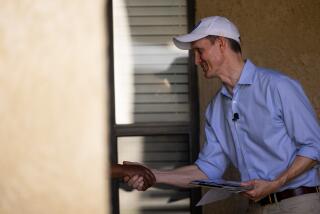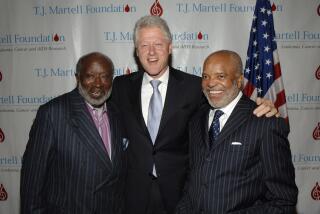With a Little Coaching, Clark Learns the Campaign Dance
NASHUA, N.H. — On his first trip to New Hampshire as a Democratic presidential contender, Wesley K. Clark alerted the news media and went shopping here for a New England-style winter campaign outfit. But the retired general didn’t buy a thing.
Irked television reporters were left with no story.
Four months and a steep learning curve later, Clark visited a Concord retirement home to speak about his health-care plan. But first, he stopped at the home’s craft shop and purchased a sky-blue cap and mittens for his new grandson. Then he faced the cameras and talked about his only grandchild, born Christmas Day, and how the hat and mittens had been knitted by a resident of Havenwood-Heritage Heights.
A health-care plan that increases benefits to the elderly -- pitched by a silver-haired new grandfather shopping for his grandson -- made for much-improved coverage.
“That really demonstrated the evolution of his skills as a presidential candidate,” said one campaign aide. “He heard the beat and learned to dance.”
When Clark, the onetime commander of NATO forces, joined the race for the White House on Sept. 17, some of the other contenders had been campaigning for well over a year. And they include some of the nation’s most experienced politicians.
Howard Dean won five races for governor of Vermont. Sen. Joe Lieberman of Connecticut was nearly elected vice president in 2000. This is the second time Rep. Dick Gephardt of Missouri has sought his party’s nomination for president.
Clark had but one experience running for office -- homeroom president in the 12th grade. He voted for his friend and rival, Steve Buchanan. Steve, he says, did not return the sporting gesture. Clark lost by one vote.
“That was my first lesson in politics,” he likes to say. “I plan to vote for myself this time.”
In a matter of months, Clark, who during 34 years in the Army grew used to being saluted, has had to learn how to shake a couple hundred hands a day -- firm but not too, lest the hand weaken and deliver meek grips. He’s had to study political district maps and, during speeches in conservative areas, remember not to hammer too hard on his support of abortion rights.
The task of teaching Clark how to raise his voice and keep speaking through applause, and to repeat the same phrase 10 or 15 times a day, has fallen to a handful of veteran campaign strategists. They’ve worked hard, they admit, but insist that their student is an almost impossibly quick study.
Still, Clark sometimes makes the mistake of speaking too quickly, and backtracking later.
This month, a reporter asked Clark if he would nominate an antiabortion judge to the Supreme Court. Clark said he did not have “litmus tests” for his judicial nominations, only to call the reporter back and say he would not nominate a judge who opposed abortion.
Clark also tends to founder a bit when he doesn’t seem particularly fascinated by the topic at hand, as shown during a recent tour of Page Belting Co. in Concord. When his conversation with Page President Mark Coen faltered, Clark spotted jars full of rivets and fasteners. “So,” Clark managed, “where do you get your bit parts?”
He saved himself, to some degree, by turning the query into a brief discussion of how Americans are losing manufacturing jobs to overseas companies.
By contrast, Clark was so tickled to bump into a couple of philosophy professors at Lou’s Restaurant in Hanover, N.H., that he sat down, uninvited, and launched into a conversation that covered the gamut from Platonic theory to nanotechnology. (Before leaving, he bought $26 worth of Lou’s pies.)
Flipping pancakes at a Dartmouth College fraternity house, he was similarly delighted to learn that one of his fellow grillers was studying physics. He spent 10 minutes discussing such topics as the influence of string theory on various schools of philosophical thought.
“I loved those kids!” Clark said later in the day. “They were fantastic.”
Clark visited the fraternity about 8 a.m., following a mile-plus swim. Some of his aides believe he’s at his best on the trail right after a swim and, the theory goes, full of adrenaline.
Others think he’s at the top of his game late at night.
The straight-laced military man “gets loose when he gets tired,” one aide said, “and that’s good.”
One of Clark’s best performances in recent weeks came at a dinner speech in Bismarck, N.D.
After 17 hours, during which he had already campaigned in New Hampshire and Wisconsin and held two news conferences, he frequently wandered off-script. Instead of struggling to get back on, however, he followed his mind where it took him, earning a half-dozen standing ovations as he touched on topics ranging from the war in Iraq to making sure a base PX store was stocked with Pampers.
That was inspired,” gushed Tom Dickson, chairman of the state’s Democratic party. “And when he was talking off the cuff he was especially outstanding.”
After years spent delivering the orders, Clark is still getting used to being ushered around and told what he can and cannot do by young campaign hands. Half a dozen times a day, he feels his personal assistant, 26-year-old Amad Jackson, tapping him and whispering, “We’ve got to go, we’ve got to go.”
Perhaps to goad his cautious handlers, he tells voters almost every day that he plans to go skiing soon, only to have his traveling press secretary roll his eyes and mumble for the umpteenth time, “He’s not going skiing.”
He misses skiing, he said, misses seeing his grandson, and is still getting accustomed to all the attention. But he wants to be president, and so Clark is learning to play the campaign game.
A few hours after reporters inquired about his health Friday, Clark found himself at a YMCA in Plymouth, standing outside a weight room. He headed in to pump some iron, and allowed photographers to follow. Within an hour, pictures of the fit-looking, weight-lifting candidate were being broadcast around the globe.
More to Read
Get the L.A. Times Politics newsletter
Deeply reported insights into legislation, politics and policy from Sacramento, Washington and beyond. In your inbox three times per week.
You may occasionally receive promotional content from the Los Angeles Times.










